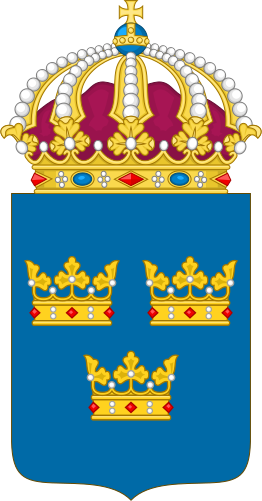Location
The Government of the Kingdom of Sweden (Swedish: Konungariket Sveriges regering) is the national cabinet and the supreme executive authority of Sweden. The short-form name Regeringen ("the Government") is used both in the Fundamental Laws of the Realm and in the vernacular, while the long-form is only used in international treaties.
The Government operates as a collegial body with collective responsibility and consists of the Prime Minister—appointed and dismissed by the Speaker of the Riksdag (following an actual vote in the Riksdag before an appointment can be made)—and other cabinet ministers (Swedish: Statsråd), appointed and dismissed at the sole discretion of the Prime Minister. The Government is responsible for its actions to the Riksdag.
Following the adoption of the 1974 Instrument of Government on 1 January 1975—the Government in its present constitutional form was constituted—and in consequence thereof the Swedish Monarch is no longer vested any nominal executive powers at all with respect to the governance of the Realm, but continues to serve as a strictly ceremonial head of state.
From wikipedia article Government of Sweden
Members:
Resources
Displaying 11 - 15 of 21Act relative to municipal immovable property tax.
This Act concerns annual taxation of dwellings and small agricultural units as defined in section 1. The tax shall be paid by owners of immovable property as defined in section 5 of Chapter 1 of the Immovable Property Tax Act (1979:1152). The Act sets out rules relative calculation and procedures for the payment of tax.
Minerals Act.
This Act applies to the exploration and exploitation of deposits, situated on the owned land or on land belonging to someone else, if the deposit contains anyone of the mineral substances specified in section 1 (concession minerals). This Act shall not be applicable to areas within public waters of the sea. The Act provides for the right to exploration and exploitation of mineral substances, and regulates the granting of and conditions of exploration permits and exploitation concessions, compensation, etc.
Minerals Ordinance.
In implementing provisions of the Minerals Act, this Regulation provides for the application for an exploration permit, decision concerning exploration permit, extension of the period of exploration, fees, granting of exploitation concessions, and proceedings for the designation of land, and contains detailed provisions regarding restrictions on to exploration works. An application for an exploration permit shall be made in writing and shall be submitted to the Mining Inspector in accordance with article 1 and following.
Act relative to management of societies.
This Act regulates the registration, composition and administration of societies created in accordance various Acts relative to landed property and water.
Law relative to the protection of agricultural land.
This Act regulates the use of agricultural land for purposes of protection of the soil and the landscape. Agricultural land is land used for cultivation or pasture, which is registered for tax purposes as an agricultural unit (sect. 1). The Act does not apply to agricultural land which is not used as such (sect. 2). Regulation making powers of the Government are described in sections 6A and 6B. Observation of provisions of the present Act shall be supervised by County Councils. Use of land requires notification and in certain circumstances a permit of the County Council. (13 sections)


